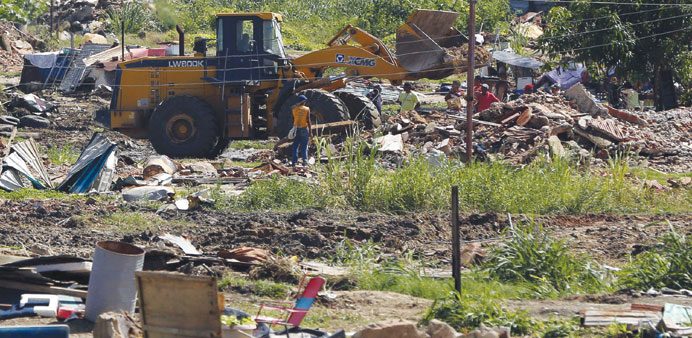Reuters/Valencia, Venezuela
When Venezuelan troops and police launched an early-morning raid on the slum neighbourhood of Brisas del Hipodromo last month, they detained hundreds of men without presenting arrest warrants and used heavy machinery to destroy hundreds of homes.
President Nicolas Maduro’s socialist government, which launched a far-reaching security crackdown in July that has killed dozens of suspected criminals, said the August 17 operation in Valencia aimed to break up right-wing Colombian paramilitary groups.
Residents, who strenuously deny links to organised crime or the drug trade, returned to the area and built improvised shacks from the remains of their homes - only to have those structures knocked down in a separate operation by troops on Thursday.
“All the money I had in the bank, I put into my house to be able to live decently, but now I live worse than a dog,” said Angela Holguin, 56, who was returning from a clinic after an operation when she discovered her home was being levelled.
“We can’t figure out what we’re being punished for, because this is too much humiliation,” she said, standing near the remains of a destroyed church.
Under Maduro’s latest security campaign, authorities have arrested thousands of citizens, raided homes, and destroyed private property without legally-mandated court orders, according to rights groups and residents.
Activists say they have received dozens of complaints of mass arrests of citizens with no link to criminals, degrading treatment by troops, and theft of personal property during the campaign known as “Operation to Free the People,” or “OLP.”
Fifty-two people were killed resisting arrest during the first month of the operations, the government said, though it has not mentioned any police casualties. Rights groups say this pattern signals illegal executions disguised as gun battles.
The campaign has included the deportation of hundreds of Colombians living near the border, drawing global attention last month as migrants returned to their native country with their belongings on their backs.
Venezuela’s interior ministry did not respond to questions regarding the security operations.
State ombudsman Tarek William Saab, the government’s principal human rights advocate who was himself illegally arrested in 2002 during a coup against late socialist leader Hugo Chavez, did not respond to an e-mailed list of questions.
In comments to local media, Saab has acknowledged “police excesses” and arrests of unnecessary numbers of people, but has broadly supported the security crackdown.
Maduro dismisses the human rights complaints as sabotage by political adversaries and promises the campaign will improve security in Venezuela, which UN statistics show had the world’s second-highest murder rate in 2012.
“The plan is to consolidate territories of peace wherever the OLP operations take place, to free the people of this paramilitary stain and these criminal gangs that sully our people,” Maduro said during a televised address in August.
The campaign appears to be the most aggressive security policy of more than 20 anti-crime plans launched since Chavez took office in 1999.
The raids generally start before dawn with a combination of police and troops descending on neighbourhoods or towns believed to be under the control of criminal gangs.

